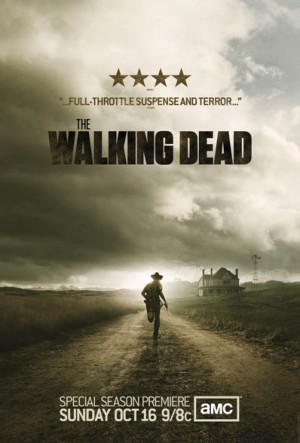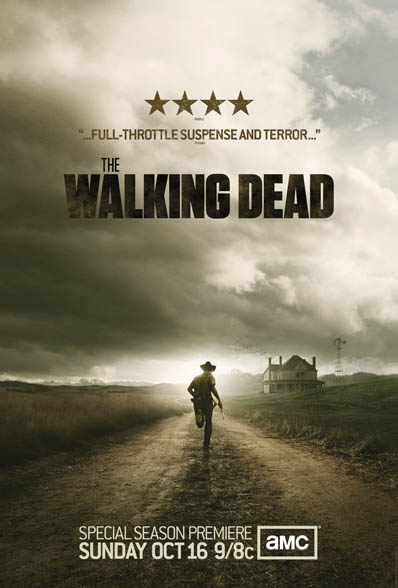Are people more effectively defined in the direst situations or through their day-to-day mundanities? Do we get to know characters better when they are in the crucible of tense drama or when they are going about their day as they normally would? There are strong arguments for either side, and I think that most would agree that a good balance of the two would result in a more textured character. But, what happens when heightened circumstances are basically all that is left?
This question springs into my mind every time I watch AMC’s zombie smash-hit The Walking Dead. First and foremost, I have not read the graphic novels upon which this series is based—I am only writing about the series thus far. The Walking Dead has scored some of the highest ratings in cable TV history. The zombie fiction genre is immensely popular at the moment—but does the zombie narrative lend itself to television?

What TWD does well is the zombies themselves. The action sequences are well choreographed and edited to create a sense of tension and danger. The FX team that creates the titular walking dead is doing great work. The zombies are genuinely terrifying.
The problem is with The Walking Dead’s living characters.
After an exceedingly strong pilot episode and a tour de force performance from Lenny James (whose character Morgan remains the most compelling on the show despite having only appeared in the pilot), TWD has stumbled when it comes to developing its central group of survivors. The first season centered mostly around the soapy love triangle surrounding the show’s central family rather than giving each individual character some depth. That, coupled with generally wooden dialogue, does not serve the characters well—to the point where I found myself rooting for the zombies.
One of the root causes, I think, of the poor characterization on The Walking Dead ties into my initial question. These people are living in the midst of the apocalypse. Trying to survive in the wake of the destruction of civilization is an extreme and pretty hopeless circumstance. What we see these characters doing is all under the grim backdrop of the end of the world—it is virtually impossible to ever see these characters having fun or doing anything like they normally would. We never get that other side of the balance—the small behavioral moments that create characters we love.
The second season of The Walking Dead would do well to take a note from Lost—a serialized drama that also had its characters under constantly dire circumstances but was able to develop them fully through good use of flashbacks. TWD did have a flashback at the top of its second episode this season, but that flashback showed one of the main characters, Lori, find out her husband has been shot. Sure, it’s dramatic, but does it tell us anything about the character other than that she cares about her husband?
The Walking Dead needs to find a way to let us get to know their characters under circumstances that don’t involve zombies. Otherwise, it will be hard to care about Rick, Lori, Carl and the rest of the survivors when they are cornered by a mob of walking dead.
The zombies are awesome, though.


We must be watching a different show because there are some characters that are being brilliantly developed. Daryl is one that springs immediately to mind. The depth he’s given, and the way Norman Reedus is playing him with all the subtle nuances is just fantastic and has evolutionized his character beyond that of a stereotypical redneck to someone who, while he still has a seemingly hard edge to him, is also showing a more humane, caring and pragmatic side to him as well. You can see his need to “belong” within the group and you can see the group valuing him as well. You can also see that while he does want to belong, he still hangs back a bit in that vulnerability. Sorry to go on and on but he’s just a fantastic character with the best lines, seriously hilarious yet meaningful as well.
And let’s not forget Carl, and the young guy that plays him, Chandler Riggs is just insanely talented as well.
I think the problem is that some people are wanting the show to always be at a fast, kill all the walkers pace and if there’s an episode that slows it’s pace from that then they cry foul. I, for one, am glad for the episodes that do slow down b/c it gives us time to know these characters more and more. So I think if people who say there isn’t character development would slow their expectations to the pace the writers are giving us, they’ll enjoy it that much more.
Chandra,
I actually agree about Daryl, and I regret not mentioning him in the article. Norman Reedus is doing great work with a character that really could have been a disaster if not treated fairly. The humane side of him is great character development.
I see where you’re coming from in terms of the pace of the show, and I think you’re right that what the writers are going for is a sort of slow burn in terms of getting to know the characters on a deeper level.
My problem is that if a show is going to slow down its pace to a crawl, as TWD has in these first three episodes, the episodes need to have very strong thematic resonance to make up for the slow pacing. Last week’s episode “Save the Last One” was one of the show’s strongest episodes since the pilot because it used its slow pace to explore the idea of death being more merciful than existence in a hopeless zombie-infested world. Additionally, establishing Shane as a darker presence gives us a good idea of who will be the villain of the season which gives the show more direction.
With the exception of last week, however, the show hasn’t shown any signs of direction or theme for the season–it largely feels like things are just happening to these people with no throughline or thematic meaning. It’s hard to feel like we’re getting to know these characters at all when they’re just reacting with horror to the world around them. Right now the plot is being driven by happenstance (Sophia getting lost, Carl being shot) rather than any sort of causality. The characters are only reacting but never acting. They are reacting like any person would, but the characters’ reactions aren’t distinctive enough for us to feel like we really know them or care about their fate. Sometimes putting characters in such an extreme circumstance renders their personality irrelevant, because they can only react to it in a certain way for the story to make sense. There’s too much reaction and not enough action.
I think another element of many people’s frustration with the show’s pace is that the show is thus far disregarding the big cliffhanger of what the doctor whispered to Rick at the CDC. Leaving that loose end for this long is frustrating and only serves to highlight the slow pace at which the show has been moving.
I’m sorry for how long this response is, but I would love to hear your thoughts.